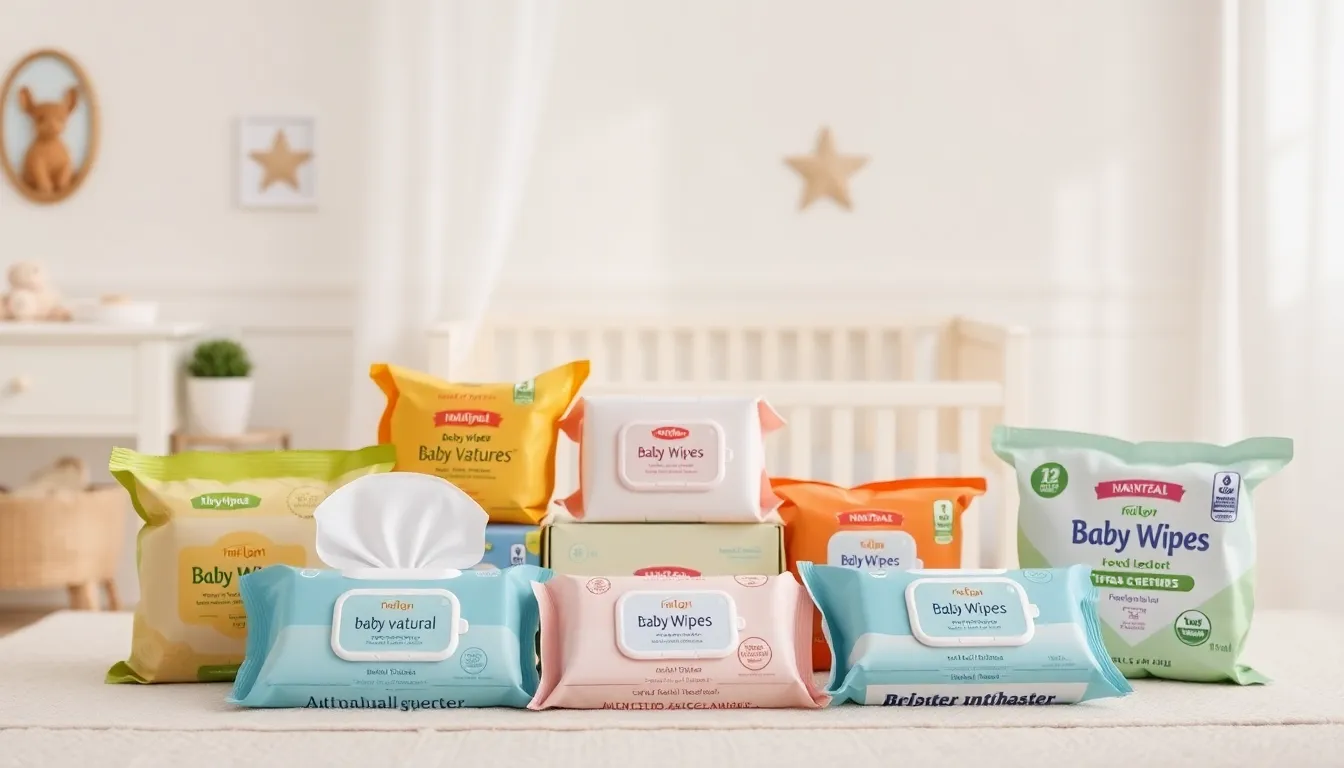When it comes to parenting, few things are as essential as baby wipes. They’re the unsung heroes of diaper changes and snack time disasters. But what happens when those trusty wipes turn into the center of a legal storm? Enter the Costco class action lawsuit that has parents scratching their heads and raising their eyebrows.
Table of Contents
ToggleOverview of the Costco Class Action Lawsuit
A class action lawsuit against Costco focuses on baby wipes and allegations of false advertising. Parents claim the wipes contain harmful substances that may affect infants’ skin. Legal filings mention inconsistencies between product labels and actual ingredients.
The lawsuit consolidates consumer grievances, gathering affected individuals together. Specific brands of baby wipes sold at Costco come under scrutiny. Concerns revolve around skin irritations and allergic reactions reported by users.
In 2021, products were tested, and results indicated the presence of potential irritants not disclosed on packaging. The lawsuit argues this misrepresentation violates consumer protection laws. Parents express frustration, seeking remedies for potential damages incurred.
Claims allege that despite knowing the risks, the company continued marketing these baby wipes as safe for children. Legal experts suggest that if evidence supports these claims, Costco may face significant financial repercussions. Class action status allows affected consumers to seek compensation as a united front.
Current developments indicate ongoing discussions about a possible settlement. Legal representatives encourage affected parties to monitor the case closely. By participating in the lawsuit, consumers aim to hold Costco accountable for their purchasing decisions regarding baby care products.
Background on Baby Wipes

Baby wipes serve as a convenient solution for parents, essential for quick clean-ups during diaper changes and messy activities. The ongoing class action lawsuit against Costco sheds light on numerous concerns about their baby wipes.
Types of Baby Wipes
Various types of baby wipes cater to specific needs. Some wipes feature all-natural ingredients, designed for sensitive skin. Other options include scented and antibacterial varieties that aim to provide extra freshness. Disposable wipes offer convenience, while reusable cloth wipes appeal to eco-conscious families. Each type addresses different preferences, ensuring parents can find a suitable choice.
Common Concerns Among Parents
Parents frequently express concerns regarding the ingredients in baby wipes. Many worry about potential allergens and irritants harming their infants’ delicate skin. Reports indicate instances of skin irritations and allergic reactions linked to certain brands. Misrepresentations on packaging amplify these worries, as some parents expected a higher standard of safety. The possibility of harmful substances in baby wipes raises significant anxiety, turning product selection into a cautious process for many caregivers.
Details of the Lawsuit
The class action lawsuit against Costco revolves around serious allegations regarding the safety of its baby wipes. Claims include harmful substances in the wipes that could potentially impact infants’ sensitive skin.
Claims Made Against Costco
Users report that the wipes contain undisclosed irritants, which may lead to skin irritations and allergic reactions. Parents join the lawsuit arguing Costco falsely advertised the safety of its products. Legal documents suggest discrepancies exist between what is stated on product labels and the actual ingredients present. Additional concerns arise from the belief that these hidden substances might jeopardize a child’s health. Many claim that the marketing language does not properly reflect the potential risks associated with these wipes.
Key Evidence Presented
Testing conducted in 2021 revealed the presence of significant irritants in the wipes. Initial lab reports identified these substances, which are not listed on the packaging. Parents submitted photographs and documentation showing skin reactions on their children after using the wipes. Expert testimonies highlight the potential health risks posed by these undisclosed ingredients. Regulatory agencies emphasize safe product marketing, strengthening the lawsuit’s claims regarding misleading information. This body of evidence presents a compelling case, as affected parents seek accountability from Costco.
Impact on Consumers
The ongoing Costco class action lawsuit surrounding baby wipes has led to significant concerns among consumers, particularly parents looking for safe products for their infants.
Reactions from Parents
Parents express deep frustration and anxiety about the allegations in the lawsuit. Reports of skin irritations among children have sparked outrage, as many caregivers feel misled. Numerous social media posts highlight personal experiences with skin reactions that may stem from the wipes. A common sentiment among parents includes disappointment in Costco’s commitment to safety, creating a sense of distrust. Caregivers emphasize the importance of transparency, urging retailers to prioritize accurate labeling. Calls for accountability resound within parenting communities, as parents share their stories of seeking safer alternatives.
Potential Changes in Product Safety
Potential changes in product safety standards could emerge due to the lawsuit’s findings. Legal experts suggest that if the allegations gain traction, Costco may need to reformulate its baby wipes, prioritizing the removal of harmful ingredients. Increased scrutiny from regulatory agencies might follow, impacting labeling practices across the industry. Manufacturers may adopt stricter testing procedures to enhance consumer safety. With heightened awareness, parents may demand more rigorous testing protocols and ingredient transparency in future products. Shifts in product formulations could ultimately foster a safer environment for infants and instill greater confidence among caregivers.
Legal Implications for Costco
The ongoing class action lawsuit against Costco carries significant legal implications for the retailer. Consumers allege that Costco misrepresented the safety of its baby wipes, which may lead to financial penalties and required changes in product formulation. Legal experts emphasize the chance of substantial financial repercussions if the claims are proven true. Regulatory agencies scrutinizing these allegations could impose stricter guidelines on labeling and marketing for all baby products.
Evidence presented in the case includes testing results from 2021 that revealed undisclosed irritants in the wipes. Parents argue that these findings contradict marketing claims, thus questioning Costco’s commitment to safety. Documented experiences of skin irritations among infants further strengthen the plaintiffs’ case. Testimonies from experts highlight the need for accurate ingredient disclosure to safeguard consumers.
Consumer trust has already been affected, prompting calls for transparency. Many parents feel anxious and frustrated, believing they were misled by Costco’s advertised safety. This sentiment is reflected in discussions and posts on social media platforms, amplifying demands for reforms. The potential for increased scrutiny from regulatory bodies may force Costco to reevaluate its labeling practices.
Effective risk management becomes critical for Costco amidst this lawsuit. Implementing changes to ensure accurate product representation will be essential for restoring consumer confidence. Overall, the implications extend beyond legal matters, affecting how Costco markets its baby wipes and similar products in the future.
The ongoing class action lawsuit against Costco regarding its baby wipes highlights significant concerns for parents. As they navigate the complexities of ingredient safety and product labeling, the potential for financial repercussions looms over the retailer. Parents are increasingly demanding transparency and accountability, reflecting a broader trend in consumer expectations for baby products.
The outcome of this lawsuit could lead to changes not only for Costco but also for the baby care industry as a whole. With heightened scrutiny on product formulations and marketing practices, the case serves as a reminder of the importance of trust in consumer-brand relationships. As developments unfold, parents are encouraged to stay informed and advocate for safer products for their little ones.



